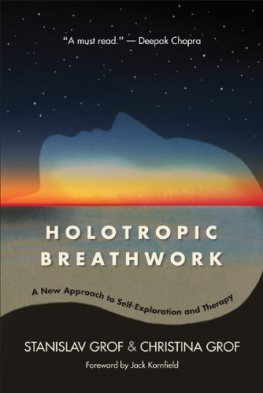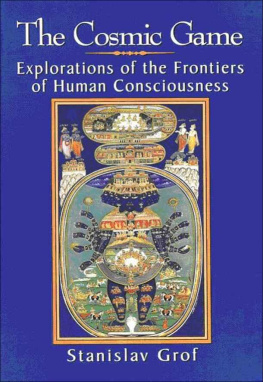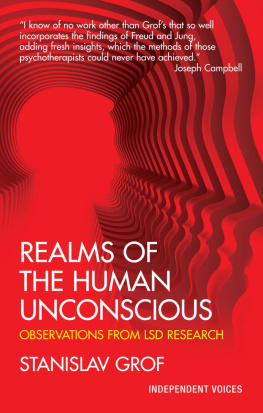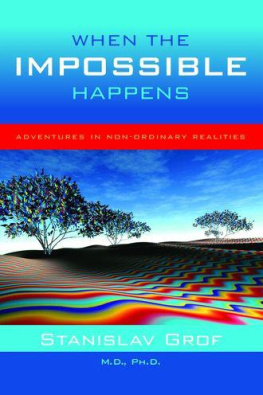Grof - Psychology of the Future : Lessons from Modern Consciousness Research
Here you can read online Grof - Psychology of the Future : Lessons from Modern Consciousness Research full text of the book (entire story) in english for free. Download pdf and epub, get meaning, cover and reviews about this ebook. year: 2000, publisher: LightningSource, genre: Religion. Description of the work, (preface) as well as reviews are available. Best literature library LitArk.com created for fans of good reading and offers a wide selection of genres:
Romance novel
Science fiction
Adventure
Detective
Science
History
Home and family
Prose
Art
Politics
Computer
Non-fiction
Religion
Business
Children
Humor
Choose a favorite category and find really read worthwhile books. Enjoy immersion in the world of imagination, feel the emotions of the characters or learn something new for yourself, make an fascinating discovery.

Psychology of the Future : Lessons from Modern Consciousness Research: summary, description and annotation
We offer to read an annotation, description, summary or preface (depends on what the author of the book "Psychology of the Future : Lessons from Modern Consciousness Research" wrote himself). If you haven't found the necessary information about the book — write in the comments, we will try to find it.
Grof: author's other books
Who wrote Psychology of the Future : Lessons from Modern Consciousness Research? Find out the surname, the name of the author of the book and a list of all author's works by series.
Psychology of the Future : Lessons from Modern Consciousness Research — read online for free the complete book (whole text) full work
Below is the text of the book, divided by pages. System saving the place of the last page read, allows you to conveniently read the book "Psychology of the Future : Lessons from Modern Consciousness Research" online for free, without having to search again every time where you left off. Put a bookmark, and you can go to the page where you finished reading at any time.
Font size:
Interval:
Bookmark:
PSYCHOLOGY OF THE FUTURE
SUNY series in Transpersonal and Humanistic Psychology
Richard D. Mann, editor
Lessons from Modern Consciousness Research
STANISLAV GROF

Published by
State University of New York Press, Albany
2000 State University of New York
All rights reserved
Printed in the United States of America
No part of this book may be used or reproduced in any manner whatsoever without written permission. No part of this book may be stored in a retrieval system or transmitted in any form or by any means including electronic, electrostatic, magnetic tape, mechanical, photocopying, recording, or otherwise without the prior permission in writing of the publisher.
For information, contact State University of New York Press, Albany, NY www.sunypress.edu
Production by Marilyn P. Semerad
Marketing by Fran Keneston
Library of Congress Cataloging-in-Publication Data
Grof, Stanislav, 1931
Psychology of the future : lessons from modern consciousness research / Stanislav Grof.
p. cm. (SUNY series in transpersonal and humanistic psychology)
Includes bibliographical references and index.
ISBN 0-7914-4621-2 (alk. paper) ISBN 0-7914-4622-0 (pbk.: alk. paper)
1. Altered states of consciousness. 2. Consciousness. 3. Spirituality. 4.
PsychologyPhilosophy. 5. PsychiatryPhilosophy. 6. Transpersonal psychology.
I. Title. II. Series.
BFIO45.A48 G76 2000
154.4dc21 00-025255
10 9 8 7 6
To Christina
with much love and deep appreciation
for your contributions to the ideas
expressed in this book
CHAPTER ONE
Healing and Heuristic Potential of
Nonordinary States of Consciousness
CHAPTER TWO
Cartography of the Human Psyche:
Biographical, Perinatal, and Transpersonal Domains
CHAPTER THREE
Architecture of Emotional and Psychosomatic Disorders
CHAPTER FOUR
Spiritual Emergency: Understanding and
Treatment of Crises of Transformation
CHAPTER FIVE
New Perspectives in Psychotherapy and Self-Exploration
CHAPTER SIX
Spirituality and Religion
CHAPTER SEVEN
The Experience of Death and Dying: Psychological,
Philosophical, and Spiritual Perspectives
CHAPTER EIGHT
The Cosmic Game: Exploration of the
Farthest Reaches of Human Consciousness
CHAPTER NINE
Consciousness Evolution and Human Survival:
Transpersonal Perspective on the Global Crisis
More than forty years ago, a powerful experience lasting only several hours of clock-time profoundly changed my personal and professional life. As a young psychiatric resident, only a few months after my graduation from medical school, I volunteered for an experiment with LSD, a substance with remarkable psychoactive properties that had been discovered by the Swiss chemist Albert Hofmann in the Sandoz pharmaceutical laboratories in Basel.
This session, particularly its culmination period during which I had an overwhelming and indescribable experience of cosmic consciousness, awakened in me an intense lifelong interest in nonordinary states of consciousness. Since that time, most of my clinical and research activities have consisted of systematic exploration of the therapeutic, transformative, and evolutionary potential of these states. The four decades that I have dedicated to consciousness research have been for me an extraordinary adventure of discovery and self-discovery.
I spent approximately half of this time conducting therapy with psychedelic substances, first in Czechoslovakia in the Psychiatric Research Institute in Prague and then in the United States, at the Maryland Psychiatric Research Center in Baltimore, where I participated in the last surviving American psychedelic research program. Since 1975, I have worked with holotropic breathwork, a powerful method of therapy and self-exploration that I have developed jointly with my wife Christina. Over the years, I have also supported many people undergoing psychospiritual crises, or spiritual emergencies as Christina and I call them.
The common denominator of these three situations is that they involve nonordinary states of consciousness or, more specifically, an important subcategory of them that I call holotropic. In psychedelic therapy, these states are induced by administration of mind-altering substances, such as LSD, psilocybin, mescaline, ibogain, and tryptamine or amphetamine derivatives. In holotropic breathwork, consciousness is changed by a combination of faster breathing, evocative music, and energy-releasing body-work. In spiritual emergencies, holotropic states occur spontaneously, in the middle of everyday life, and their cause is usually unknown.
In addition, I have been more peripherally involved in many disciplines that are, more or less directly, related to nonordinary states of consciousness. I have participated in sacred ceremonies of native cultures in different parts of the world, had contact with North American, Mexican, and South American shamans, and exchanged information with many anthropologists. I have also had extensive contact with representatives of various spiritual disciplines, including Vipassana, Zen, and Vajrayana Buddhism, Siddha Yoga, Tantra, and the Christian Benedictine order.
Another area that has received much of my attention has been thanatology, the young discipline studying near-death experiences and the psychological and spiritual aspects of death and dying. I participated in the late 1960s and early 1970s in a large research project studying the effects of psychedelic therapy in individuals dying of cancer. I should also add that I have had the privilege of personal acquaintance and experience with some of the great psychics and parapsychologists of our era, pioneers of laboratory consciousness research, and therapists who developed and practiced powerful forms of experiential therapy that induce nonordinary states of consciousness.
My initial encounter with nonordinary states was very difficult and intellectually, as well as emotionally, challenging. In the early years of my laboratory and clinical research with psychedelics, I was daily bombarded with experiences and observations, for which my medical and psychiatric training had not prepared me. As a matter of fact, I was experiencing and seeing things which, in the context of the scientific worldview I was brought up with, were considered impossible and were not supposed to happen. And yet, those obviously impossible things were happening all the time.
After I had overcome my initial conceptual shock and doubts about my own sanity, I began to realize that the problem might not be in my capacity to observe, or in my critical judgment, but in the limitations of current psychological and psychiatric theory and of the monistic materialistic paradigm of Western science. Naturally, it was not easy for me to come to this realization, since I had to struggle with the awe and respect a medical student or a beginning psychiatrist feels toward the academic establishment, scientific authorities, and impressive credentials and titles.
Over the years, my initial suspicion about the inadequacy of academic theories concerning consciousness and the human psyche has gradually turned into certainty, nourished and reinforced by thousands of clinical observations, as well as personal experiences. At this point, I have no doubts that the data from the research of nonordinary states of consciousness represent a critical conceptual challenge for the scientific paradigm that currently dominates psychology, psychiatry, psychotherapy, and many other disciplines.
Next pageFont size:
Interval:
Bookmark:
Similar books «Psychology of the Future : Lessons from Modern Consciousness Research»
Look at similar books to Psychology of the Future : Lessons from Modern Consciousness Research. We have selected literature similar in name and meaning in the hope of providing readers with more options to find new, interesting, not yet read works.
Discussion, reviews of the book Psychology of the Future : Lessons from Modern Consciousness Research and just readers' own opinions. Leave your comments, write what you think about the work, its meaning or the main characters. Specify what exactly you liked and what you didn't like, and why you think so.





